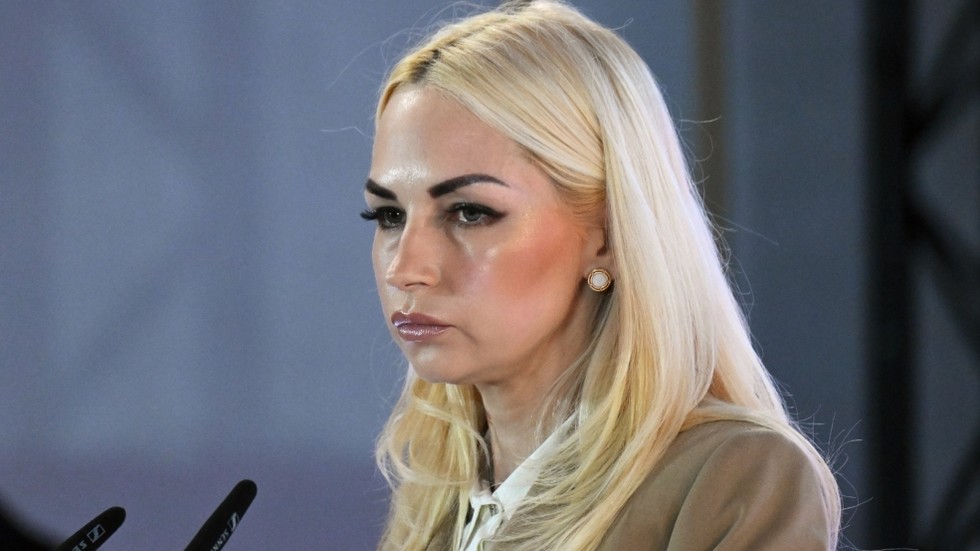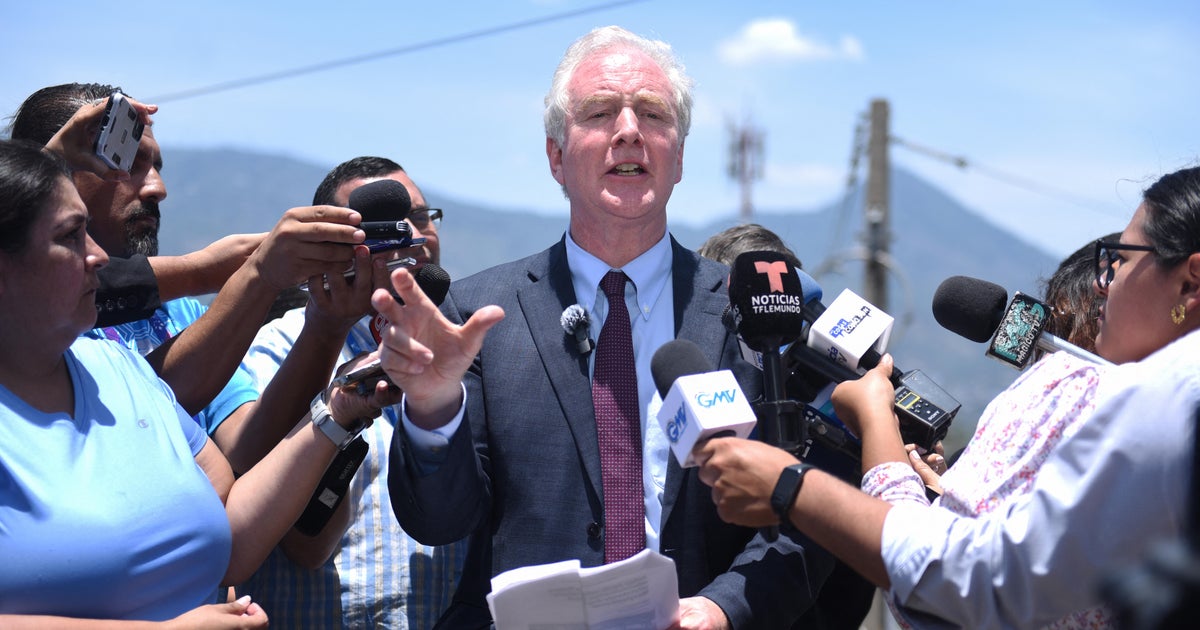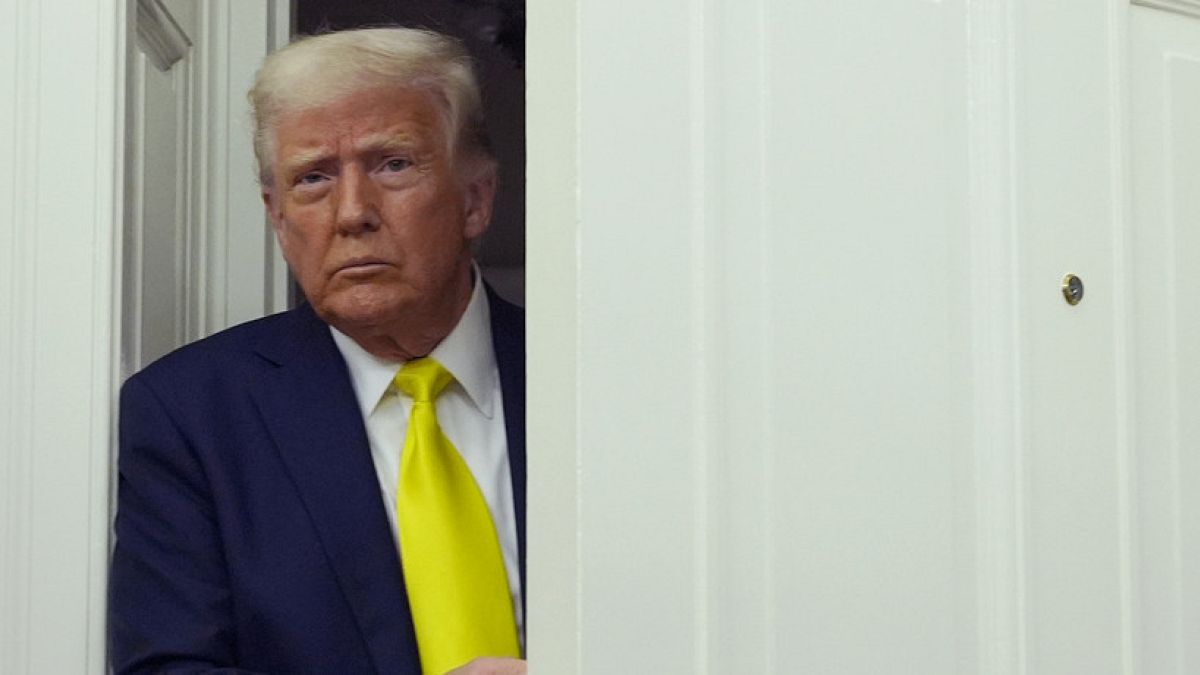04/16/2025April 16, 2025
What has happened so far today?
As we continue our coverage of the global repercussions of US President Donald Trump's tariffs, here's a look at our coverage so far today.
Japan's Economic Revitalization Minister and chief trade negotiator Ryosei Akazawa is expected to meet Trump administration Treasury Secretary and Trade Representative Jamieson Greer later today. Japan is a key US ally, with Trump last week pausing a 24% tariff on Japanese goods and instead slapping a 10% levy on imports from the wealthy Asian country.
Trump is also expected to be present at the trade talks with Japan at the White House.
Also on Wednesday, China said it does not fear a trade war with the US. The Trump admin imposed a 145% tariff on all Chinese goods, whereas China has retaliated with a 125% tariff on all American goods. China appointed a new top international trade negotiator amid the tariff battle.
China appoints hardline new trade negotiator
Hong Kong is also facing a 145% tariff on its goods. Hong Kong accused the US of bullying with the tariffs, and said it would "suspend the acceptance of postal items containing goods destined to the US."
The White House said "the ball is in China's court" when it comes to making a trade deal.
Singapore Prime Minister Lawrence Wong, meanwhile, said there is "little comfort" in the US delaying elevated tariff rates on many countries in the world. The US for now has 10% tariffs on goods from most nations, along with the high aforementioned tariffs on Chinese goods and 25% tariffs on foreign cars.
Wong said the tariff changes have created "great uncertainty for businesses everywhere," while adding that "No company can comfortably plan long-term investments while knowing that the tariff rates could be changed at a moment's notice."
https://p.dw.com/p/4tDUn
Skip next section Trump to attend talks with Japan trade envoy04/16/2025April 16, 2025
Trump to attend talks with Japan trade envoy
US President Donald Trump said he will take part in a meeting on Wednesday with a senior trade envoy from Japan for tariff negotiations.
Japanese Economic Revitalization Minister Ryosei Akazawa is making a three-day visit to Washington this week.
Akazawa is also due to meet the US Treasury Secretary Scott Bessent, Commerce Secretary Howard Lutnick and Trade Representative Jamieson Greer at the White House on Wednesday.
"Japan is coming in today to negotiate Tariffs, the cost of military support, and 'TRADE FAIRNESS.' I will attend the meeting, along with treayury and commerce secretaries," Trump said on his Truth Social platform.
"Hopefully something can be worked out which is good (GREAT!) for Japan and the USA!" the US president added.
In 2023, Japan was the largest foreign investor in the US. Since 1990, direct investment in the US economy from Japan has totaled $783.3 billion (€689 billion) — more than Canada, Germany and the United Kingdom.
Those investments, however, did not stop Trump from targeting Japanese imports with his "reciprocal" tariffs.
Although a 24% levy on Japanese imports was included in Trump's 90-day tariff pause, Japan is still facing a blanket 10% tariff on all goods. Tokyo is also subject to the US president's 25% tariff on specifically for car, steel and aluminum imports.
https://p.dw.com/p/4tChk
Skip next section 'Little comfort' in US tariff reprieve: Singapore PM04/16/2025April 16, 2025
'Little comfort' in US tariff reprieve: Singapore PM
Singapore Prime Minister Lawrence Wong said on Wednesday that there is "little comfort" in the US postponing sweeping tariffs on most of the world.
After initially imposing so-called "reciprocal" tariffs on most of the US' trading partners, US President Donald Trump abruptly reversed course last week, announcing a 90-day pause.
However, "baseline" tariffs of 10% on most imports, as well as 25% tariffs on car, steel and aluminum imports, have remained in place.
In a speech at an event organised by the city-state's Ministry of Foreign Affairs, Wong said "geopolitical competition," which had largely been dormant since the end of the Cold War, had "returned with a vengeance" and that "major powers no longer feel economically secure" amid the escalating trade war between the US and China.
"Where economic interdependence was once seen as a virtue, it is now seen as a vulnerability," Wong said.
Trump stands firm on tariffs as domestic uncertainty grows
The prime minister said that while these trends are not new, "they have reached a new intensity with the latest US tariff moves."
"The US has since postponed most of its reciprocal tariffs, but there is little comfort in this, because the current baseline tariff rates are still much higher than what they used to be, and the changes have already caused great uncertainty for businesses everywhere," Wong said.
"No company can comfortably plan long-term investments while knowing that the tariff rates could be changed at a moment’s notice," he added.
https://p.dw.com/p/4tC9t
Skip next section China 'not afraid' of trade war with US04/16/2025April 16, 2025
China 'not afraid' of trade war with US
China on Wednesday said it was ready to negotiate, but would not back down in a trade war with the US.
The comments from the Chinese Foreign Ministry come a day after Donald Trump said "the ball is in China's court" as Washington looks to pressure Beijing into negotiating a trade deal.
"If the US really wants to resolve the issue through dialogue and negotiation, it should stop exerting extreme pressure, stop threatening and blackmailing, and talk to China on the basis of equality, respect and mutual benefit," Foreign Ministry spokesman Lin Jian said.
"This tariff war was initiated by the US side... China does not want a fight, but it is not afraid of one either," Lin added during a daily press conference.
The Trump administration has imposed a 145% tariff on all goods from China, although small electronics have since been exempted. China has responded with a 125% tariffs on all US goods.
https://p.dw.com/p/4tBpO
Skip next section Hong Kong suspends postal service to US over Trump's 'bullying'04/16/2025April 16, 2025
Hong Kong suspends postal service to US over Trump's 'bullying'
 Hongkong Post said its customers should be prepared to pay "exorbitant and unreasonable fees" [FILE: February 7, 2025]Image: Liau Chung-ren/ZUMA Press Wire/picture alliance
Hongkong Post said its customers should be prepared to pay "exorbitant and unreasonable fees" [FILE: February 7, 2025]Image: Liau Chung-ren/ZUMA Press Wire/picture alliance Hong Kong's postal service said Wednesday that it has suspended goods shipments by sea to the US because of Washington's "bullying" tactics.
Hongkong Post also said it would suspend its air mail service for goods from April 27.
"The US is unreasonable, bullying and imposing tariffs abusively. Hongkong Post will definitely not collect any so-called tariffs on behalf of the US and will suspend the acceptance of postal items containing goods destined to the US," the government department said in a statement.
Packages containing only documents will not be affected.
Hong Kong, as a Special Administrative Region of China, has been slapped with the same 145% tariffs facing Beijing.
Earlier this month, US President Donald Trump signed an executive order ending a duty-free arrangement for goods valued at $800 (€702.7) or less from May 2 onwards, a move the White House said would clamp down on illegal shipments.
The new rules will see these lower value goods face a 30% tax or a flat fee of $25, which is due to double from June 1.
https://p.dw.com/p/4tBit
Skip next section Asia markets fall again after Nvidia AI chip exports restricted04/16/2025April 16, 2025
Asia markets fall again after Nvidia AI chip exports restricted
Stock markets in Asia were down again Wednesday after a relatively calm couple of days following last week's global turmoil caused by Trump's tariffs.
Hong Kong's Hang Seng fell 2.5%, while the Shanghai Composite index gave up 0.9%. Tokyo's Nikkei 225 index shed 0.9%, and South Korea's Kospi fell 0.7%.
The slump comes after Washington last night announced new licensing rules on shipments of AI chips made by US giant Nvidia.
Nvidia's shares fell by 6.3% in the wake of stricter controls on its chip exports to China. The company said the measures would cost $5.5 billion (€4.84 billion).
https://p.dw.com/p/4tBiE
Skip next section White House says 'the ball is in China's court'04/16/2025April 16, 2025
White House says 'the ball is in China's court'
The White House has said the "ball is in China's court" as it continues to pressure Beijing into renegotiating the trade relationship between the world's two largest economies, who are locked in a tit-for-tat trade war.
China is facing 145% tariffs on all goods entering the US. Beijing has retaliated with a 125% levy on US goods.
China is the only country not to be subject to a 90-day pause on the sweeping, "reciprocal" tariffs Trump had announced on April 2, although the US president has exempted electronics from the measures.
At a press briefing late on Tuesday, White House press secretary Karoline Leavitt read out a statement from President Donald Trump that said "the ball is in China's court. China needs to make a deal with us. We don't have to make a deal with them."
"There is no difference between China and any other country except they are much larger," the US president added, according to Leavitt.
The remarks come after Trump said Beijing had "reneged" on the delivery and purchase of jets from US aviation company Boeing, following a report by Bloomberg on Tuesday.
In a post on his Truth Social platform, Trump said "(China) just reneged on the big Boeing deal, saying that they will 'not take possession' of fully committed to aircraft," without providing further details.
'Increased China tariffs will disrupt global commerce'
https://p.dw.com/p/4tBag
Skip next section China appoints new trade envoy in commerce ministry shake up04/16/2025April 16, 2025
China appoints new trade envoy in commerce ministry shake up
China has named Li Chenggang to replace Wang Shouwen as its top international trade negotiator, amid an escalating trade war between the world's two largest economies over Donald Trump's tariffs.
Wang, who has also served as the vice minister of commerce, was involved in negotiations for a trade deal between China and the US in 2020.
Li Chineggang, whose most recent role was as China's envoy to the World Trade Organization, had previously served as an assistant commerce minister during Trump's first term in the White House.
China calls on US to cancel reciprocal tariffs
The surprise announcement comes as Beijing pushes back against Trump's 145% tariffs on Chinese goods.
Trump's "reciprocal" tariffs, announced on April 2, caused turmoil in global markets before the White House abruptly backed down last week, announcing a 90-day pause for all countries — except China.
Beijing has responded to Trump's tariffs with levies of 125% on US goods.
President Xi Jinping and Commerce Minister Wang Wentao are currently on a tour of Southeast Asia, where many countries are facing the threat of Trump's tariffs.
"We can only speculate as to why this happened at this precise moment; but it might be that in the view of China's top leadership, given how tensions have continued escalating, they need someone else to break the impasse in with both countries find themselves and finally start negotiating," Alfredo Montufar-Helu, a senior advisor to the Conference Board's China Center, told Reuters.
https://p.dw.com/p/4tBSJ
Skip next section Japan trade chief heads to Washington for tariff talks04/16/2025April 16, 2025
Japan trade chief heads to Washington for tariff talks
 Japanese Economic Revitalization Minister Ryosei Akazawa will meet with senior White House officials in WashingtonImage: The Yomiuri Shimbun via AP Images/picture alliance
Japanese Economic Revitalization Minister Ryosei Akazawa will meet with senior White House officials in WashingtonImage: The Yomiuri Shimbun via AP Images/picture allianceJapan's Economic Revitalization Minister and chief trade negotiator Ryosei Akazawa is visiting Washington this week for tariff talks with senior White House officials.
Akazawa is due to meet with Treasury Secretary Scott Bessent and Trade Representative Jamieson Greer later on Wednesday.
Ahead of the trip, Akazawa told reporters that he was confident that the two countries — who have been close allies since World War II — would be "able to build a relationship of trust and conduct good negotiations that will lead to a win-win relationship."
While Trump last week paused a 24% tariff on Japanese goods, Japan, like most countries, is still facing a "universal" 10% levy on exports to the US as well as a 25% duty on cars, steel and aluminum imports.
While Japanese Prime Minister Shigeru Ishiba has described the tariffs situation as "a national crisis," he told parliament on Monday that his government would not be retaliating against Washington, saying the measures would only further harm Japan's economy and national interests.
https://p.dw.com/p/4tBUE
Skip next section Welcome to our coverageChina has appointed Li Chenggang to replace Wang Shouwen as its international trade envoy, as Beijing continues to weigh up its response to the massive tariffs imposed by US President Donald Trump.
Japan's Economic Revitalization Minister Ryosei Akazawa will be in Washington this week for discussions with US Treasury Secretary Scott Bessent and Trade Representative Jamieson Greer.
Tokyo is hoping to "build a relationship of trust" and convince Washington to drop 24% duties.
Meanwhile, the White House has said "the ball is in China's court" and that it "needs to make a deal with us," after Trump accused Beijing of reneging on a deal to buy Boeing jets and parts.
People around the globe worried about Trump tariffs
https://p.dw.com/p/4tBRH

 2 days ago
8
2 days ago
8









